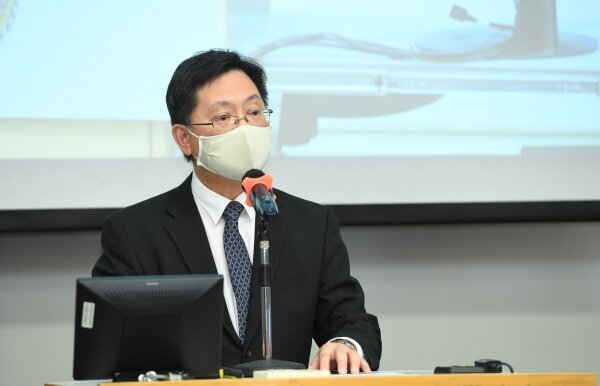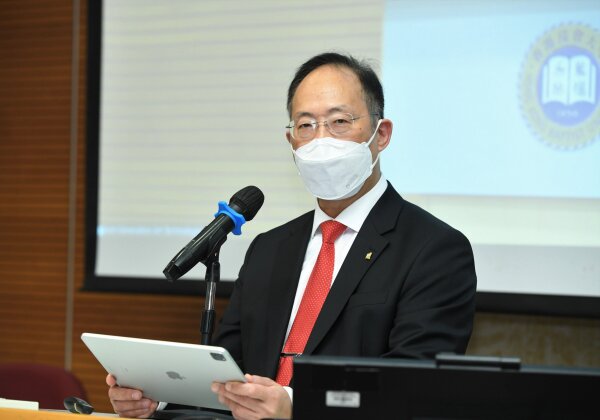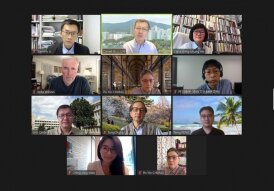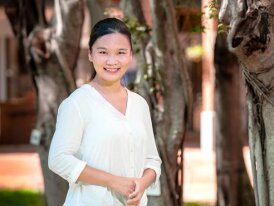
HKBU forum explores next-generation art technologies
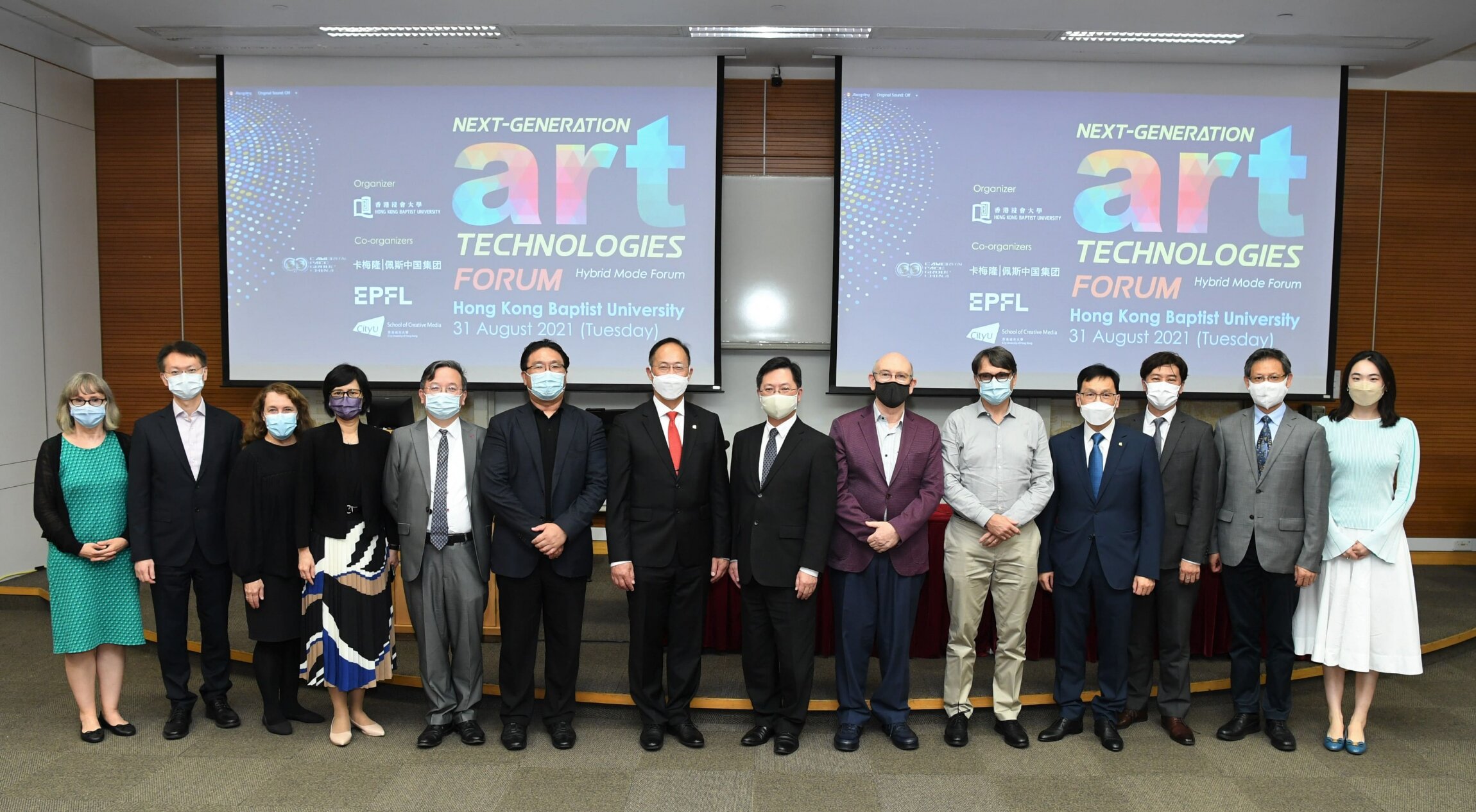
Professor Alexander Wai, President and Vice-Chancellor of HKBU (7th from left), Mr Alfred Sit Wing-hang, Secretary for Innovation and Technology of the Government of the HKSAR (7th from right) and experts from industry and academia participate in the Next-Generation Art Technologies Forum. Mrs Cherry Tse Ling Kit-ching, Permanent Secretary for Home Affairs of the Government of the HKSAR, joins the Forum online.
Hong Kong Baptist University (HKBU) held the Next-Generation Art Technologies Forum today (31 August), bringing together experts from industry, academia and government to discuss the fusion of science, technology and art, and the opportunities opened up by the new era of Art Tech.
The Forum, conducted in hybrid mode, was co-organised by the Cameron Pace Group – China, a 3D technology and production company led by renowned movie director James Cameron; the École Polytechnique Fédérale de Lausanne (EPFL) of Switzerland; and the School of Creative Media at the City University of Hong Kong (CityU).
Mr Alfred Sit Wing-hang, Secretary for Innovation and Technology, and Mrs Cherry Tse Ling Kit-ching, Permanent Secretary for Home Affairs of the Government of the HKSAR, were the Forum's guests of honour.
In a digital age it is essential to adapt in order to thrive, and the Forum shed light on the opportunities that this age offers both globally and in Hong Kong. The Chief Executive of HKSAR, in her 2020 Policy Address, highlighted the revolutionary nature of Art Tech and the impact that it makes on how people perceive, consume and respond to art and culture. The Government has also committed resources in support of Art Tech initiatives.
Mr Alfred Sit Wing-hang said the application of arts tech has extended the horizon of creativity in arts and brought new opportunities for the creative industries. Leveraging the bold and innovative spirit of local artists, and the active promotion and support of the Government, Hong Kong provides an excellent environment for arts tech to flourish and thrive.
"We have set aside a total of $100 million under various government schemes to provide financial support to organisations interested in promoting arts tech, and will provide venues and complementary facilities for experimental use," Mr Sit added.
Mrs Cherry Tse Ling Kit-ching said, "Quality trans-disciplinary collaboration will help position Hong Kong to realise the vision for it to become a hub of innovation and technology as well as a hub for arts and cultural exchange between China and the rest of the world as outlined in the 14th Five-Year Plan of the People's Republic of China. Realising this vision holds enormous benefits for Hong Kong, not only in terms of jobs and business, but also in enabling our people, especially the young, to fulfil their aspirations."
HKBU is a cradle of creativity. Combining its strengths in creative arts and sciences, the University is well poised to push Art Tech forward.
Professor Alexander Wai
President and Vice-Chancellor
Professor Alexander Wai, President and Vice-Chancellor of HKBU, said that in the past, art and technology tended to be in different domains, but technology has assumed an increasingly important role in assisting artists not just to produce their existing works but also to create new art works and forms.
"HKBU is a cradle of creativity. Combining its strengths in creative arts and sciences, the University is well poised to push Art Tech forward. Leveraging the latest AI and other technologies, we will continue to create new art works and forms, and contribute to the long-term sustainability and viability of the arts ecosystem in Hong Kong and beyond. Looking forward, our Art Tech capabilities will rocket to another level with the construction of the state-of-the-art Jockey Club Campus of Creativity," said Professor Wai.
The University was recently awarded a HK$52.8 million grant under the Research Grants Council's Theme-based Research Scheme for a five-year groundbreaking project entitled "Building Platform Technologies for Symbiotic Creativity in Hong Kong". This innovative undertaking will harness the power of science and technology to advance human and AI interaction in art creation and welcome in a new era of Art Tech.
At the Forum, Professor Guo Yike, Vice-President (Research and Development) of HKBU, gave an overview of the latest developments in Art Tech. Professor Mette Hjort, Dean of Arts of HKBU; Professor Jeffrey Shaw, the Yeung Kin Man Chair Professor of Media Art from the School of Creative Media at CityU; and Professor Sarah Kenderdine, Director of the Laboratory for Experimental Museology at EPFL, shared their insights on future of cinema systems, which will be a major focus of the next generation of Art Tech.
The Forum also featured two roundtable discussion sessions. One with the theme "Where is Technological Innovation Heading in Arts and Culture?" was moderated by Professor Johnny M Poon, Associate Vice-President (Interdisciplinary Research) of HKBU. The second, with the theme "How and Why Organisations Invest in Art Technologies?", featured Ms Doris Fong, Head of Creative Industries of Invest Hong Kong, as moderator. A number of local and international industry professionals, academic experts, and representatives from related governmental bodies and NGOs participated in the discussions. The Forum was concluded by closing remarks by Professor Rick Wong, Interim Provost of HKBU.
Previous News
Next News
31.08.2021


